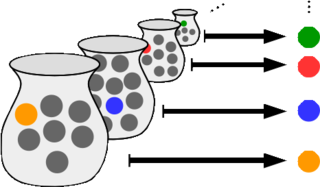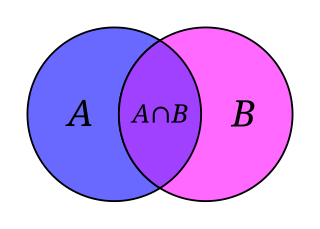
In mathematics, the axiom of choice, abbreviated AC or AoC, is an axiom of set theory equivalent to the statement that a Cartesian product of a collection of non-empty sets is non-empty. Informally put, the axiom of choice says that given any collection of sets, each containing at least one element, it is possible to construct a new set by choosing one element from each set, even if the collection is infinite. Formally, it states that for every indexed family of nonempty sets, there exists an indexed set such that for every . The axiom of choice was formulated in 1904 by Ernst Zermelo in order to formalize his proof of the well-ordering theorem. The axiom of choice is equivalent to the statement that every partition has a transversal.
An axiom, postulate, or assumption is a statement that is taken to be true, to serve as a premise or starting point for further reasoning and arguments. The word comes from the Ancient Greek word ἀξίωμα (axíōma), meaning 'that which is thought worthy or fit' or 'that which commends itself as evident'.
Mathematical logic is the study of formal logic within mathematics. Major subareas include model theory, proof theory, set theory, and recursion theory. Research in mathematical logic commonly addresses the mathematical properties of formal systems of logic such as their expressive or deductive power. However, it can also include uses of logic to characterize correct mathematical reasoning or to establish foundations of mathematics.

Set theory is the branch of mathematical logic that studies sets, which can be informally described as collections of objects. Although objects of any kind can be collected into a set, set theory — as a branch of mathematics — is mostly concerned with those that are relevant to mathematics as a whole.
In set theory, the axiom schema of replacement is a schema of axioms in Zermelo–Fraenkel set theory (ZF) that asserts that the image of any set under any definable mapping is also a set. It is necessary for the construction of certain infinite sets in ZF.
In set theory, Zermelo–Fraenkel set theory, named after mathematicians Ernst Zermelo and Abraham Fraenkel, is an axiomatic system that was proposed in the early twentieth century in order to formulate a theory of sets free of paradoxes such as Russell's paradox. Today, Zermelo–Fraenkel set theory, with the historically controversial axiom of choice (AC) included, is the standard form of axiomatic set theory and as such is the most common foundation of mathematics. Zermelo–Fraenkel set theory with the axiom of choice included is abbreviated ZFC, where C stands for "choice", and ZF refers to the axioms of Zermelo–Fraenkel set theory with the axiom of choice excluded.
In mathematics and logic, an axiomatic system is any set of primitive notions and axioms to logically derive theorems. A theory is a consistent, relatively-self-contained body of knowledge which usually contains an axiomatic system and all its derived theorems. An axiomatic system that is completely described is a special kind of formal system. A formal theory is an axiomatic system that describes a set of sentences that is closed under logical implication. A formal proof is a complete rendition of a mathematical proof within a formal system.

In mathematics, and particularly in set theory, category theory, type theory, and the foundations of mathematics, a universe is a collection that contains all the entities one wishes to consider in a given situation.
Reverse mathematics is a program in mathematical logic that seeks to determine which axioms are required to prove theorems of mathematics. Its defining method can briefly be described as "going backwards from the theorems to the axioms", in contrast to the ordinary mathematical practice of deriving theorems from axioms. It can be conceptualized as sculpting out necessary conditions from sufficient ones.
In mathematics, two sets or classes A and B are equinumerous if there exists a one-to-one correspondence (or bijection) between them, that is, if there exists a function from A to B such that for every element y of B, there is exactly one element x of A with f(x) = y. Equinumerous sets are said to have the same cardinality (number of elements). The study of cardinality is often called equinumerosity (equalness-of-number). The terms equipollence (equalness-of-strength) and equipotence (equalness-of-power) are sometimes used instead.
In mathematics, the axiom of dependent choice, denoted by , is a weak form of the axiom of choice that is still sufficient to develop much of real analysis. It was introduced by Paul Bernays in a 1942 article in reverse mathematics that explores which set-theoretic axioms are needed to develop analysis.
In mathematics, a non-measurable set is a set which cannot be assigned a meaningful "volume". The existence of such sets is construed to provide information about the notions of length, area and volume in formal set theory. In Zermelo–Fraenkel set theory, the axiom of choice entails that non-measurable subsets of exist.

In mathematical logic and philosophy, Skolem's paradox is the apparent contradiction that a countable model of first-order set theory could contain an uncountable set. The paradox arises from part of the Löwenheim–Skolem theorem; Thoralf Skolem was the first to discuss the seemingly contradictory aspects of the theorem, and to discover the relativity of set-theoretic notions now known as non-absoluteness. Although it is not an actual antinomy like Russell's paradox, the result is typically called a paradox and was described as a "paradoxical state of affairs" by Skolem.
In the foundations of mathematics, Morse–Kelley set theory (MK), Kelley–Morse set theory (KM), Morse–Tarski set theory (MT), Quine–Morse set theory (QM) or the system of Quine and Morse is a first-order axiomatic set theory that is closely related to von Neumann–Bernays–Gödel set theory (NBG). While von Neumann–Bernays–Gödel set theory restricts the bound variables in the schematic formula appearing in the axiom schema of Class Comprehension to range over sets alone, Morse–Kelley set theory allows these bound variables to range over proper classes as well as sets, as first suggested by Quine in 1940 for his system ML.
An approach to the foundations of mathematics that is of relatively recent origin, Scott–Potter set theory is a collection of nested axiomatic set theories set out by the philosopher Michael Potter, building on earlier work by the mathematician Dana Scott and the philosopher George Boolos.
In descriptive set theory, the Borel determinacy theorem states that any Gale–Stewart game whose payoff set is a Borel set is determined, meaning that one of the two players will have a winning strategy for the game. A Gale–Stewart game is a possibly infinite two-player game, where both players have perfect information and no randomness is involved.
A timeline of mathematical logic; see also history of logic.
This is a glossary of terms and definitions related to the topic of set theory.



